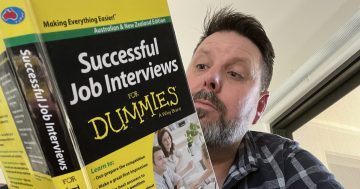Meg Watson* speaks with experts about how to find a workplace that will treat women with caregiving responsibilities fairly.
 Applying for jobs is a daunting prospect at the best of times.
Applying for jobs is a daunting prospect at the best of times.
But it can be even scarier after a few years off raising kids.
Parents — and especially mothers — have historically faced widespread discrimination in Australian workplaces, with many reporting recruiting bias when applying for new positions.
So how do you know if a workplace is going to treat you unfairly because of your caregiving responsibilities?
Should you talk about having kids at all? And how do you actually fill in that blank space on your resume?
We went to the experts for answers.
Focus on the future
Marian Baird, a professor of gender and employment relations at the University of Sydney, says it is perfectly understandable to feel anxious.
But she says also there has been an “enormous shift” in recent years with many employers and industries embracing flexible work and specifically trying to improve conditions for working parents.
“We have seen huge changes in some employers where parental leave for both mothers and fathers is now seen as standard … There are many employers who are both encouraging and understanding that women and men have lives outside of work,” Professor Baird says.
And in the midst of a labour shortage, she says many employers are simply less likely to care about a gap in your resume if you’re suited for the role.
What they really want to see is “enthusiasm and commitment”.
Career coach and former recruitment consultant Sally Watson agrees.
“It’s not about justifying yourself and [the time you’ve spent away].
“It’s about focusing on the future,” she says.
“Think about why you want to go back to work.
“What is motivating you?”
And remember: “A lot of people are going to have gaps on their resumes after the past few years we’ve had.
So it’s definitely more accepted in today’s market.”
Be clear and confident
Prospective employers aren’t allowed to ask if you have children and you’re under no obligation to disclose information about your family life.
But Ms Watson generally advises her clients to signpost any significant leave when applying for jobs.
The trick is keeping it “short, sweet and simple” (i.e. not listing all your parental responsibilities), to make sure you’re giving precedence to your relevant experience instead.
For example: “April 2021–April 2022: Parental Leave”, with nothing listed underneath.
She says this is better than omitting the leave completely as it eliminates any confusion about the gap in your resume.
If you’d rather not tell the employer you have children, you could choose different wording like “Career Break” (we spoke to one mum who recently went with “Pandemic Parenting”).
But, if it’s too vague, you should prepare for some questions later on.
“I’ve seen people get really nervous and stumble when they don’t know how to explain [their time away],” Ms Watson says.
“If the employer is asking a question and someone doesn’t come across confident in their answer, it can cause a bit of doubt in their mind.
“It’s not just what you say, but how you’re coming across in your competence and clarity.”
If the employer seems suss about it
But what happens if you’ve been positive, clear and confident… and the person interviewing you is still really hung up on the issue?
Professor Baird says it can be useful to confront the doubt head on.
You can draw attention to the fact they seem hesitant and reassure them of your experience.
You can re-state your excitement about returning to work and even bring up any efforts you’ve made to re-skill or childcare arrangements you’ve made to accommodate the change.
But, she says, “I don’t think you should concede too much”.
“If the employer is sending those signals to you, perhaps it’s not the job for you … It’s a bit of a red flag.”
Ms Watson agrees.
In fact, she says it’s useful to remember a job interview is a two-way exchange.
“You’re interviewing them as much as they’re interviewing you.
“And if they’re not going to be supportive of you having a family, are they really a great employer that you want to be working for?”
*Meg Watson is a Journalist at ABC Everyday.
This article first appeared at abc.net.au.











